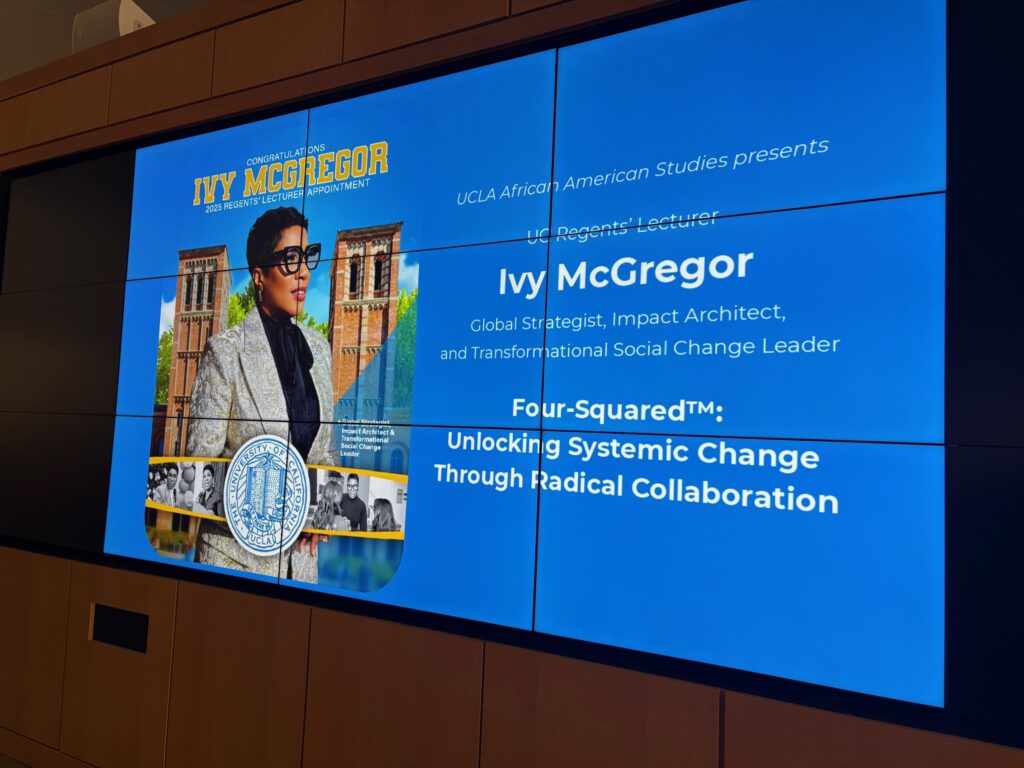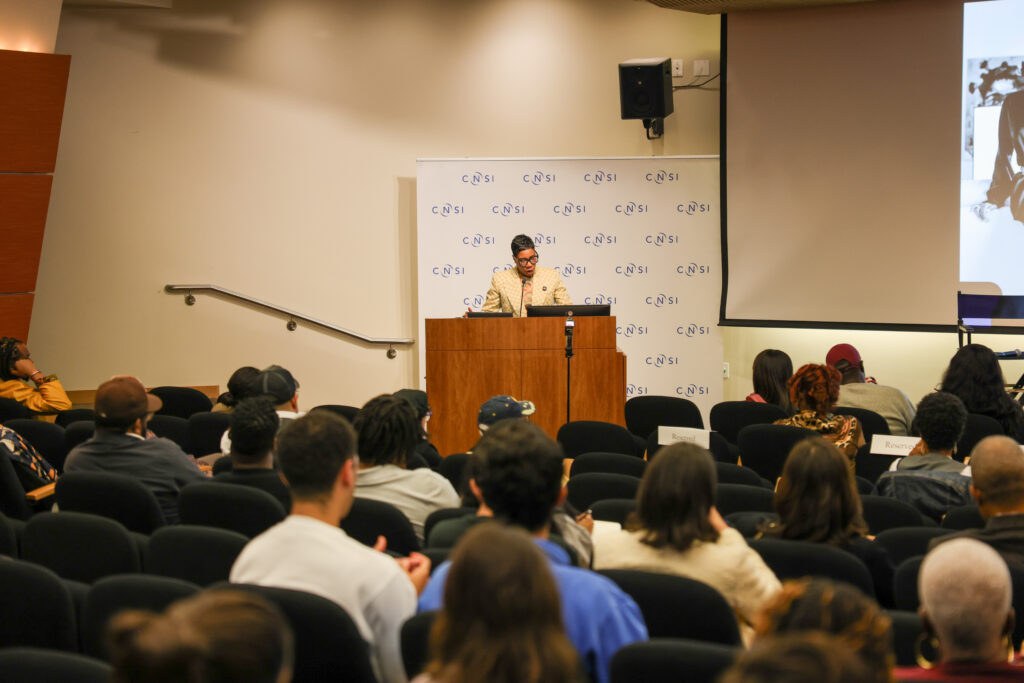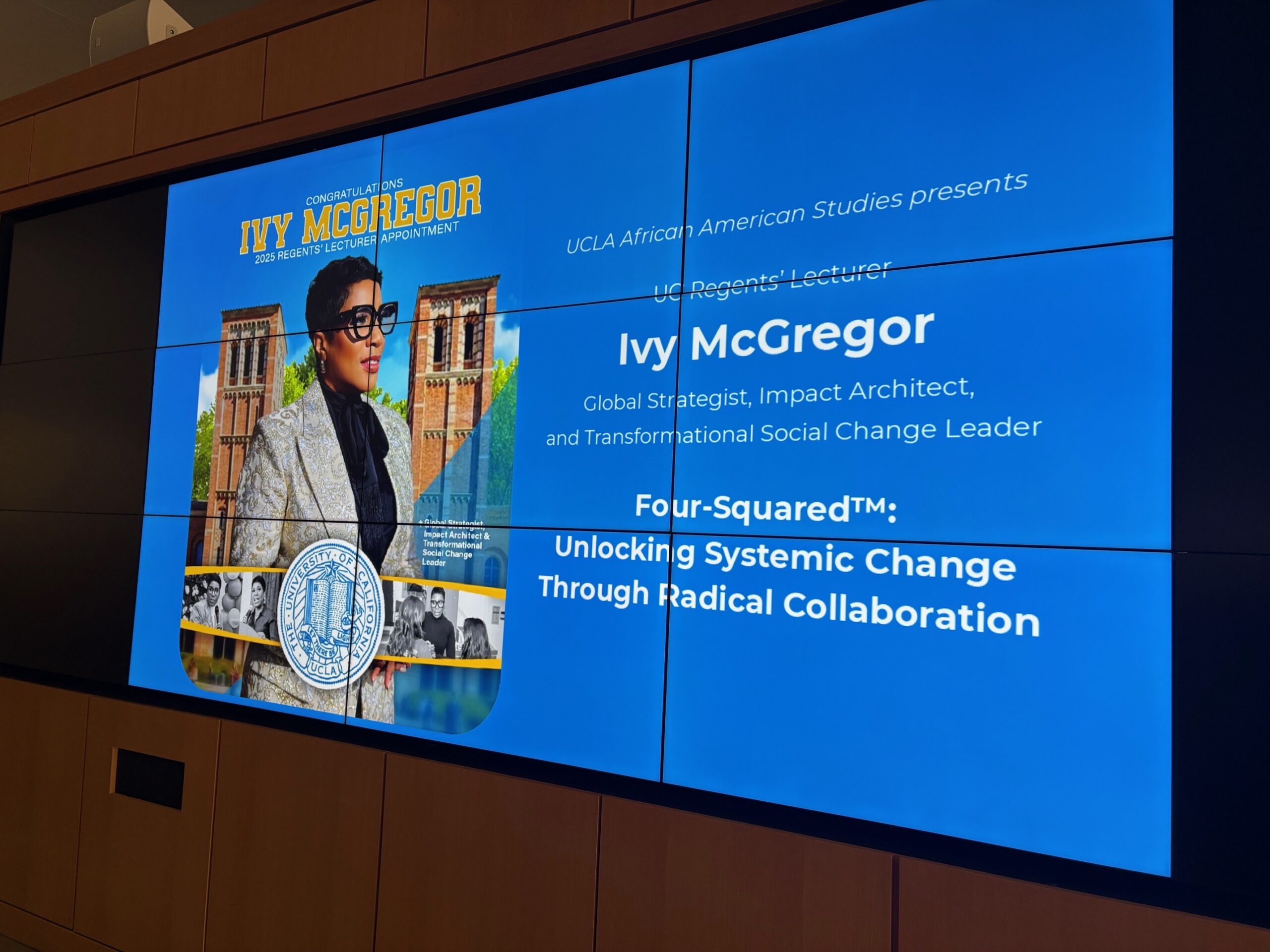The transformational social change leader urged audience members to look beyond their current social networks to enact social change

Citlalli Chávez-Nava
When Ivy McGregor took the stage for her UC Regents’ Lecture she delivered an urgent message. McGregor said that the most pressing social challenges facing society today will not be addressed if we continue to work in silos. Change, she said, will require radical collaboration.
In an evocative address held at UCLA’s California NanoSystems Institute (CNSI) on Oct. 8, McGregor, a global strategist, impact architect and transformational changemaker opened her lecture by telling students, faculty and community members that oftentimes the biggest transformations we witness in society begin with the efforts and intention of a single individual, reminding audience members of their own power to advance a new framework for enacting change.
As an example of this truth, she referenced her mother, 87, who was in attendance. Raising five children on her own, she instilled the blueprint for social action from which McGregor continues to draw inspiration for the work she does today.
“She made sure there was always an abundance of integrity, of love, of prayer, of compassion, and, of course, hope. And what we lacked in money, we made up for in connection, in community,” said McGregor.
Marcus Anthony Hunter, the Scott Waugh Endowed Chair in the Social Sciences Division and professor of sociology and African American Studies at UCLA, introduced McGregor at the event. His idea to nominate her for the Regents’ lectureship was borne out of witnessing the profound impact she had on his students during a guest visit to his “African American Studies M5: Social Organization of Black Communities,” class last fall.
“Oftentimes, in a class, the students say, ‘All this talking is great, but I want to meet application. I want to meet somebody in the world of work, and I want to be inspired by them,’” said Hunter.
He recalled how his students were so energized by McGregor’s visit, they stayed an hour past the scheduled end time to engage with her.

Photo: Adrian Davis
McGregor’s talk, titled, “Four-squared™: Unlocking Systemic Change Through Radical Collaboration,” was grounded in the vast social disparities facing the world today. McGregor discussed how 1% of the world’s population controls nearly half of its wealth; how 700 million people still live in extreme poverty; and how by the year 2030, 375 million workers will need re-skilling to remain employed.
“These are not just statistics,” she declared. “These are signals, signals that we cannot solve 21st-century problems with 20th-century systems.”
Drawing on her decades of experience leading initiatives across the nonprofit, corporate, philanthropic and entrepreneurial sectors, McGregor then introduced her “Four-Square™” framework, a model that connects these forces to drive systemic impact.
“I’ve seen each of these pillars move mountains,” McGregor said. “But I’ve also seen their brilliance trapped in silos, and I came to believe something radical, and it is that the future will not be built by one sector alone. It will be built at the intersections.”
“When these forces converge, collaboration becomes currency,” she continued.
For over a decade, McGregor served as executive director of BeyGOOD Foundation, the public charity founded by Beyoncé Knowles-Carter, where she advanced initiatives in economic equity, education, disaster relief and small business development. Known for her human-centered and hands-on approach, she has designed and led programs that address health disparities, HIV/AIDS prevention and anti-human trafficking efforts, while also advising world leaders, corporations, grassroots organizations and the United Nations.
At UCLA, McGregor urged audience members to look beyond the continuum of their social networks and to “reach across the table, across the aisle and across campus.” She invited audience members to embrace one of her signature concepts, “issue escape rooms,” intentional silo-breaking spaces that foster cross-sector dialogue and collaboration. She said, this concept could be adapted as an “issue escape tables” and easily put into practice over a meal.
“I invite you to create an ‘escape table’,” she said. “I invite you to make sure that there are individuals at your table that represent diverse sectors. So, bring someone to the table that represents wealth, bring someone to the table that represents innovation, bring someone to the table that represents need, and create an issue and say: ‘I know that the 4-5-6 of us can create a solution.’”
McGregor concluded her lecture by reminding audience members that they each have a role to play within her Four-Square™ framework as innovators, investors and amplifiers.
“This is a clarion call, my sisters and brothers, because the future doesn’t belong to the powerful. It belongs to the partners, and it begins here at UCLA, where ideas don’t just live in lecture halls, where ideas become movements.”
McGregor’s address marked the beginning of a visiting residency at UCLA during which she will attend other convenings and conversations with faculty and students designed to catalyze cross-disciplinary collaboration.
Executive Vice Chancellor and Provost Darnell Hunt and Chair of UCLA’s African American Studies Department Cheryl Keyes also provided welcoming remarks at the event. The event was hosted by UCLA’s Department of African American Studies and co-sponsored by UCLA’s Initiative to Study Hate, UCLA’s Dialogue Across Difference Initiative, UCLA’s Department of Sociology, UCLA’s Ralph J. Bunche Center for African American Studies and UCLA’s Division of Social Science.
The Regents of the University of California established the Regents’ Professors and Lecturers Program to allow the appointment, on a visiting basis, of distinguished leaders to increase students’ exposure to a diverse range of successful professionals, artists and others. Vice President Al Gore, actor Anthony Hopkins, Grammy Award winner Quincy Jones, filmmaker Kassi Lemons, jazz and blues pianist Henry Butler, composer Arturo Márquez and, activist-scholar Angela Davis, are among those who have delivered past lectures.
Corazon Adamo, a first-year physiological sciences major who attended McGregor’s lecture with Hunter’s current class, said she walked away feeling inspired.
“It all starts with finding ways to connect with those who might think differently from you, because they can open your eyes to new ways and can help fulfill your purpose and change your community.”

